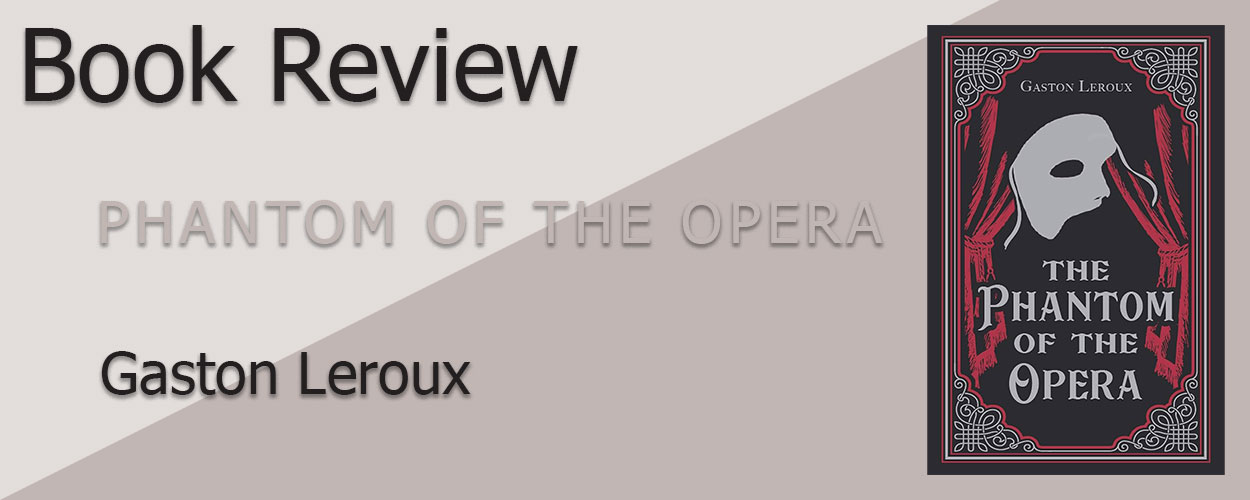

I really liked it
Reading another classic in between my modern fantasy books.
Read: June 12 – June 16, 2023
Genre: Classic, Romance
Audience: General
Book contains: graphic death, suicide, ableism, kidnapping, emotional abuse, murder, torture
Purchase a copy from Amazon.ca
The Paris Opera House is famous and popular, but it has one deep, dark secret: a ghost. He stalks the halls with a skeleton head and fiery yellow eyes, and his demands are what drive the managers to finally retire. His focus on the singer, Christine Daaé, spurs everything into action.
Since this book is a classic and therefore within the public domain, I was able to find a full and beautiful Audiobook on Spotify within the Classic Audiobook Collection. Each chapter was read aloud by a different person, which is nice because while I don’t favour some of the voices, there are others that I really enjoy listening to.
The main reason I bought this book is because I’ve been curious about the original story for a while after watching adaptations of it (especially the Scooby Doo adaptation in my youth). I recognized a bunch of characters that were brought forth in the children’s cartoon, and smiled every time one came up. I’ll have to watch that movie again—and the official Phantom of the Opera movie as well.
The Phantom of the Opera is first and foremost a love story, in which the Opera Ghost, Erik, is desperate for love but unable to achieve it because of his terrible ugliness. He is described as a “walking corpse,” hated by his parents and reviled by society. In what seems to be an effort of making up for his ugliness, though, he was gifted with extraordinary dexterity and skill in working locks, trapdoors, and other such mechanisms. It’s tragic that he can’t be accepted by society because of his differences, though, and I think it really ruined him in his youth.
The book was beautifully written, very visual but with a simple and elegant air to it. The point of view was sort of third person, sort of first person, like many classics, in which the narrator speaks directly to the reader and acknowledges themselves, but do not take an active part in the story. In The Phantom of the Opera specifically, the narrator is sort of an interviewer—someone who has collected this information after the fact and written it as a novel like those “based on a true story” books. Near the end, there is a section told from the first-person perspective of one of the characters, input as personal notes from them (which were collected by the narrator), and earlier in the book, the narrator includes snippets from another character’s personal memoir.
While there was some humour here and there, the overall tone was certainly serious, logical, and elegant, which was a nice break after many books with Humour as part of the genre. There are no convenient saves or wild escapes or anything, and though some of the characters are actively ignorant of the situation, it’s rooted in reality. Ghosts don’t exist, and therefore it is reasonable to believe that the Opera Ghost is some kind of joke or as a scam to steal a large amount of money from the Opera House.
Each of the characters was unique and carried an air of realism. I was never confused by who was who, and I thought the love story between Christine and Raoul was both sweet and somewhat sad. The Opera House managers are involved in a side plot, trying to discover who the “ghost” really is, and the Opera itself contains many characters who either believe or don’t believe in the ghost. And, of course, there is the ever-mysterious “Persian” who skulks around the place for whatever reason—which is revealed near the end.
While it’s a very sad book at times, I still highly recommend reading it. It gives great insight into how society treats those who don’t fit into the norm, and what that ostracization pushes them to do.
The Hunchback of Notre Dame by Victor Hugo
Dracula by Bram Stoker
Crime and Punishment by Fyodor Dostoevsky
Frankenstein by Mary Wollstonecraft Shelley
Tigerpetal Press is a small book press dedicated to publishing local authors and poets.